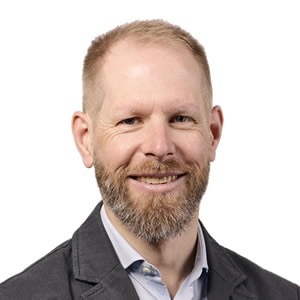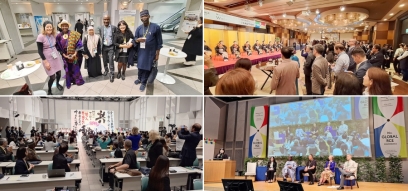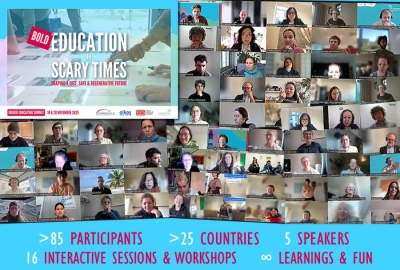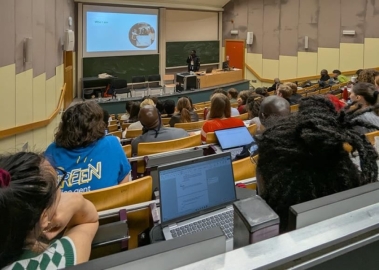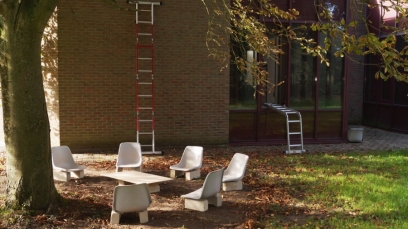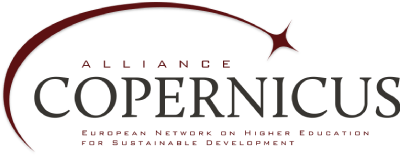#12 11/2023
Dominik Allenspach
Sustainability Officer at Zurich University of Teacher Education
| _ |
"Due to increasing internationalization, scarce public funding, the war for talent, etc., universities find themselves in an increasingly competitive environment. Sustainability-oriented universities are better prepared for this competition than non-sustainability-oriented universities." |
Tom Kuppens (TK) Can you briefly present yourself and your main expertise related to education for sustainability?
Dominik Allenspach (DA) I am sustainability officer at the Zurich University of Teacher Education (PHZH). In this role, I work with staff, students, and other stakeholders to promote the sustainable development of the university. My main area of expertise is sustainability management at higher education institutions. This includes the implementation of sustainability at various levels of the university such as governance, teaching, research, operations, outreach, and collaboration. In relation to Education for Sustainable Development (ESD), my expertise and focus is on research and teaching on sustainability competences for university managers and school leaders.
TK You mention that you manage the implementation at various levels of the university, including teaching. How much room is there for ESD in the curricula in a University of Teacher Education? Does PHZH have a specific vision towards the didactical approach of ESD?
DA Switzerland has a compulsory school curriculum for each of its language regions. ESD is an integral part of these curricula but is not an independent school subject. ESD is a guiding principle to which links are made in the existing school subjects. Teacher training programs and curricula at universities of teacher education are oriented towards these school curricula. Lecturers are therefore encouraged to make a specific contribution to the implementation of ESD in their teaching. In addition, specific ESD modules are also offered at the universities of teacher education. The vision at PHZH – according to its sustainability policy – is that all lecturers see themselves as multipliers of ESD and empower students to contribute to the sustainable development of society in their future role as teachers and multipliers. The didactic approach to ESD therefore centers on the principles of vision orientation, connected learning and participatory orientation.
TK In Flanders positions like yours are very often 'volunteering work'. Some universities did provide small financial support, but in the light of rising costs, this support is under pressure. How is that in your case?
DA I would first like to discuss the general situation at Swiss higher education institutions. There are sustainability offices at universities, universities of applied sciences and most universities of teacher education. According to a study conducted by WWF Switzerland in 2021, universities have developed positively in this regard in recent years. However, the study also points out that the sustainability offices often have too few financial and human resources to effectively advance sustainable development in all areas of higher education. In 2020, PHZH created the position of sustainability officer and made the corresponding resources available. Prior to this, the sustainable development of the university was promoted by dedicated individuals without a corresponding mandate. In my opinion, the mandatory institutional accreditation introduced in 2015 has contributed to the positive developments at many higher education institutions. The institutional accreditation includes a standard according to which higher education institutions must set goals in the area of sustainable development and demonstrate how they are implementing these goals.
TK So if I read you well, accreditation procedures had a very important role to play in making the position of a sustainability officer more structural at PHZH. Unfortunately, what accreditation organizations put in their procedures is beyond our control of course. So my question is about what is in our control: what arguments or suggestions would you give our members and me to convince our university management of the necessity of a structural mandate for a sustainability officer?
DA Due to increasing internationalization, scarce public funding, the war for talent, etc., universities find themselves in an increasingly competitive environment. I am convinced that sustainability-oriented universities are better prepared for this competition than non-sustainability-oriented universities. To achieve this, it is necessary for the university management to align the strategy with the sustainable development of the university. A sustainability officer can provide significant support to the university management in this respect. A sustainability officer can demonstrate how social and environmental costs can be reduced through efficiency, consistency, and sufficiency strategies. A sustainability officer can show how a university can set itself apart from other universities through innovative, sustainability-oriented teaching and research, which is an advantage when it comes to attracting students, recruiting staff, and acquiring third-party funding. Finally, a sustainability officer can work to ensure that a sustainability-oriented university can influence the development of the university landscape through public relations and lobbying work and thus ensure that the university's sustainability-oriented innovations are successful. Highlighting these competitive advantages of a sustainability-oriented university, to which a sustainability officer contributes, could perhaps convince the university management of the need for a corresponding structural mandate.
TK Looking back at what you achieved in your role at PHZH, what is the project you're the most proud of?
DA In my very first project as sustainability officer at PHZH, I was commissioned by the university management to develop a sustainability policy with goals and measures within a short period of time. The project required careful planning of the implementation process, the identification of important internal and external stakeholders, the holding of stakeholder dialogs and an idea of what a sustainable university should look like. A particular challenge was dealing with the conditions set by the university management on the one hand and the concerns and demands of staff and students on the other. Nevertheless, I was able to ensure that everyone involved contributed to a broadly supported and recognized sustainability policy, which forms the basis for the sustainable development of the PHZH.
TK Thank you very much for sharing your insights. They fill my backpack with arguments to start a conversation with my university management!
Contact Dominik Allenspach:

